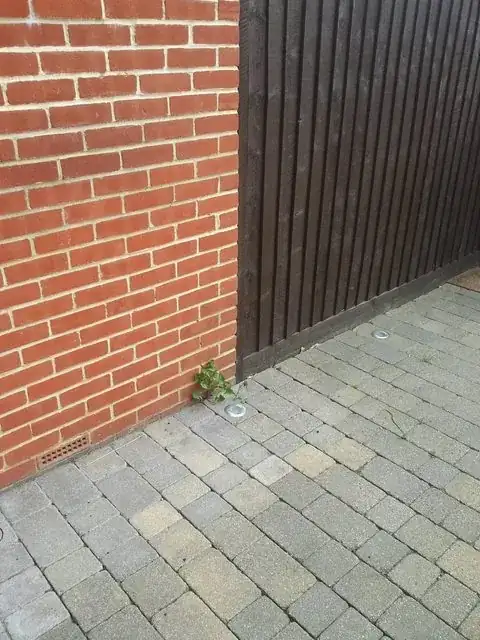I have noticed that there are weeds growing between the bricks in a paved area in my garden, as shown in the attached picture.
How do I remove them? Is there anything I can do so that I can avoid them growing in the first place?

I have noticed that there are weeds growing between the bricks in a paved area in my garden, as shown in the attached picture.
How do I remove them? Is there anything I can do so that I can avoid them growing in the first place?

If you don't want to use a chemical herbicide, boiling water poured on the weeds will kill them. Use a kettle with a spout so you can direct the water directly onto the weeds with minimal splashing, and be careful carrying it from the kitchen! This can be useful for relatively small areas, especially if you have two kettles so one can be warming up while you pour the other.
Depending on your patience, and the number of weeds, you can also use a putty knife or thin screwdriver to scrape them out of the cracks. Sometimes for particularly big-rooted weeds, I'll lift an adjoining brick if I can wiggle something in next to it.
Other solutions (that I haven't tried):
Other than pulling the weeds, these solutions will all leave you with dead weeds that you'll have to remove. If you go the herbicide route, wear gloves when handling them, and dispose of them where pets and wildlife won't get into them.
Weeds are tenacious. Nothing is going to stop them from growing forever. Well, nothing you can do that won't be dangerous to your own health or cause other problems.
Given that the pavers are already in place, you can spray the weeds periodically with something like Roundup. This will keep them down. Or use a Weedwhacker to mow them down.
Be careful on a paver walkway to not use flame to burn them down, as that can cause spalling, damaging the pavers. Be careful that you do not put down something that will cause environmental damage to nearby planted areas.
A preventive solution after you have weeded is to apply a polymeric sand onto the pavers. It fills in the cracks and sets to a porous but weed resistant surface. I initially balked at paying $25 for a bag of sand but was pleasantly surprised at how well this resists windborne seeds.
It will not stop weeds that are already present from growing up but will stop most wind borne seeds from taking hold.
I've used vinegar - it works well, but it does depend on your pavers (hunks of granite won't care, some cement pavers will). Just keep a small plant sprayer bottle filled with some, and squirt as needed.
If its just the odd weed here and there, any of the methods described in the other answers. If you find over time that weeds pop up all over, then start using a Path Weedkiller treatment - these are designed for paved areas only, and contain an ingredient that sits in the cracks for a season to prevent regrowth. Best applied in spring.
Perhaps pre-paving prevention is (or should be) the best plan in the first place. Speaking from experience, about my own weedy paving problem (which has occurred after a lot of hard work paving a large area a few years ago), a base-mix of dry sand and cement would have done a lot to prevent all the weed-seeds in the soil growing into problem weeds.
A half and half sand and cement mix wet-down after paving would have considerably lessened the likelihood of weeds growing willy-nilly in an area which unfortunately, is right at my front gate - and therefore noticed by myself and everyone coming and going, morning, noon and night!
I've tried the polymeric sand but it doesn't work. Ants dig through and weeds pop up. Don't spend your money. Spray with vinegar, but only when the sun is shining, not when it's cloudy.
The problem with any stone product is that it produces stone dust. Even if you put down landscape fabric and wash the stone before installing it, over time the stones will grind against one another and produce dust that the weeds can grow in. Putting sand or stone dust between the pavers produces the same problem. I have wondered in the past whether grouting pavers with a latex based grout would seal well enough to stop germination.